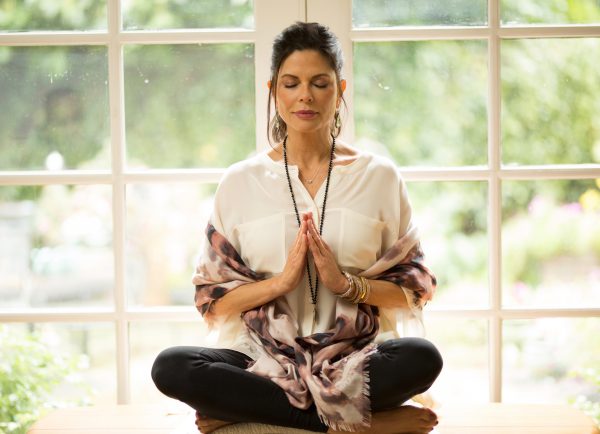Wellness entrepreneur to speak about benefits of slowing down
By Rita Robinson, Special to the Independent
Yvonne Tally was doing what she does most mornings—putting on her makeup.
 She was about to walk out the door to do what she normally does, teach Pilates, wellness and healthy-eating classes to clients desiring a calmer, more fulfilling and longer life.
She was about to walk out the door to do what she normally does, teach Pilates, wellness and healthy-eating classes to clients desiring a calmer, more fulfilling and longer life.
But she didn’t make it out the door. At least not on her own two feet.
“Everything suddenly went black,” she recalled. Her legs buckled, and she couldn’t breathe. “I thought I was having a heart attack.”
Tally ended up in the local ER. “I was having a big panic attack. I had never had one before. It came out of nowhere.” Or so she thought.
The crisis, it turns out, was the wake-up call she needed. “If this could happen to me, an organic-eating, positive-thinking person, there might be a bigger picture here.”
So, she broke up with busy. And she’s never panicked again.
“I had missed all my own signs of being overscheduled,” she said. The wake-up call firmly planted the seed for her new book, “Breaking Up with Busy,” a topic she’ll talk about at the Inside Edge breakfast meeting at 7 a.m. next Wednesday, Oct. 10, at the Pacific Club in Newport Beach.
Prior to the panic attack, she went from “a normal pace” of married and raising a daughter to the “turbo pace” of suddenly single mom starting her own Pilates and wellness business. In the same year.
“Sleepless nights were normal,” she said. “Insomnia was a big one. Crammed schedule, always trying to be in two places at one time, ramping up my business.” In a word, stress.
The bigger picture was that there might be others like her out there, thinking they’ll be rewarded for running at a hyper pace, oblivious to being a panic-attack-about-to-happen or worse. Through her coaching and now her book, Tally asks others: Are you a “busy” addict?
Here’s how you know:
- Fuzzy attention and focus. The prefrontal cortex of the brain is responsible for focus and attention. “A sense of a lingering anxious feeling affects this area of the brain and produces cortisol, which shuts down our focus,” said Tally.
- Communication conflicts. “Busy pushes its way into our significant relationships and leaves little room for emotional intimacy,” she said. “We’re frustrated, irritable and anxious about the simple things in life because we’re rushing.”
- Opting out. “Let’s say you enjoy spending one day a week with friends you go running with or have lunch with or go see a movie with,” she explained. “I call it ‘just because.’ All of sudden, things you once enjoyed now look more like a burden.”
- It’s not what, it’s how. “We stop doing things for ourselves because someone else requests our time,” she said. “We start allowing everything outside of us to drive our schedule. We become very focused on the doing, which moves us away from howwe’re doing.”
Breaking up with busy isn’t as simple as it sounds. It requires going deep to discover why busy is so important in the first place.
The bamboozle is that busy makes people feel “productive,” said Tally, but it’s really distracting people from what they enjoy and what they want to contribute.
“I call those ‘the traps’—over-giving, needing approval, not feeling loveable, keeping up, chasing prestige, recognition, status,” she said. “Busy looks like it allows us to control our personal world, like it protects us from vulnerability.”
So, what’s so wrong with feeling vulnerable? Nothing, said Tally, because it slows us down and that’s what we want.
“It’s going to feel counterintuitive, but just pause,” she said. “Take a big breath.
“When we take a big breath, we stimulate the vagus nerve and that helps us lower our blood pressure, lower our heart rate and decrease that cortisol. When these things happen, ah, then the brain can start thinking more clearly. That one, simple mindful practice can begin to change the course of our day.”
And then there’s technology. Originally purported to simplify life, it has done quite the opposite, affirms Tally. As the first generation reared on electronics, millennials now spend up to 18 hours a day on electronics (some overlapping), according to Crowdtap. And they’re seeing and suffering the effects of stress loads, focus distractions, early oldster posture, constant and close-up exposure to electronic pollution and lack of connection to what will soothe and heal them—nature, said Tally.
“No one is going to appreciate the essence, the strength and the power of healing that nature provides if we don’t have it anymore,” Tally said. “When we walk out in nature, we automatically respect and care for the space around us because we are that space. We take that deep breath. It stimulates our senses and shifts our brain and body chemistry for healing.”
How we’ll get there, said Tally, could be ironic. “We will most likely find our solutions to technology in technology,” she said. “What I mean is apps for mindfulness, apps for meditation, apps for organizing our priorities.”
That aside, well-being is still found within the human being. “When we slow down and break up with busy, we’ll hear that whisper we used to ignore because that’s our heart speaking,” Tally said.




